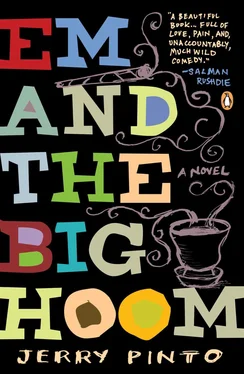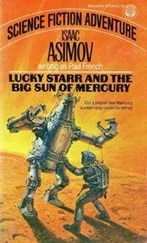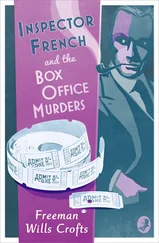Jerry Pinto - Em and the Big Hoom
Здесь есть возможность читать онлайн «Jerry Pinto - Em and the Big Hoom» весь текст электронной книги совершенно бесплатно (целиком полную версию без сокращений). В некоторых случаях можно слушать аудио, скачать через торрент в формате fb2 и присутствует краткое содержание. Год выпуска: 2014, Издательство: Penguin Books, Жанр: Современная проза, на английском языке. Описание произведения, (предисловие) а так же отзывы посетителей доступны на портале библиотеки ЛибКат.
- Название:Em and the Big Hoom
- Автор:
- Издательство:Penguin Books
- Жанр:
- Год:2014
- ISBN:нет данных
- Рейтинг книги:3 / 5. Голосов: 1
-
Избранное:Добавить в избранное
- Отзывы:
-
Ваша оценка:
- 60
- 1
- 2
- 3
- 4
- 5
Em and the Big Hoom: краткое содержание, описание и аннотация
Предлагаем к чтению аннотацию, описание, краткое содержание или предисловие (зависит от того, что написал сам автор книги «Em and the Big Hoom»). Если вы не нашли необходимую информацию о книге — напишите в комментариях, мы постараемся отыскать её.
Em and the Big Hoom — читать онлайн бесплатно полную книгу (весь текст) целиком
Ниже представлен текст книги, разбитый по страницам. Система сохранения места последней прочитанной страницы, позволяет с удобством читать онлайн бесплатно книгу «Em and the Big Hoom», без необходимости каждый раз заново искать на чём Вы остановились. Поставьте закладку, и сможете в любой момент перейти на страницу, на которой закончили чтение.
Интервал:
Закладка:
Barely standing, and that wasn’t enough. Home was where others had to gather grace. Home was what I wanted to flee.
Home was a blood-stained bathroom which, when it was scraped down for repainting, revealed an old suicide note, scrawled in pencil. So the one I remembered, the one Susan and I had witnessed, that one was attempt number three, at the very least.
Home was uncertainty: Who would open the door? Em in a panic of sorrow? Em in a rage against some unnamed enemies? Em in a laughing fit with a beedi fuming in her hands?
One day, under the huge mango tree that stood in the schoolyard, with a bunch of schoolboys standing around me, mocking me for being the son of a mad woman, I thought suddenly and automatically: ‘I want to go home.’ And then I thought as suddenly: ‘I don’t want to go home.’ I remember thinking, ‘If I go on like this, I will go mad.’ I tried not to think too much about home as a concept after that.
Inside and outside, inside and outside. Each exerted its own special pull on me. My job as a journalist meant late nights; you did not leave the office until the newspaper was put to bed. This meant I was away until ten-thirty on most days; Susan, as a lecturer in English literature at a college, came home by mid-afternoon. I would call her soon after and ask, ‘Everything okay?’ This was code for ‘Is she all right?’ Her reply would always be, ‘About the same,’ but this was as false as it was true. Em was subject to microweathers; her manic phase could vary from cheerful and laughing to malevolent and sneering, and back again within an hour. In contrast, her depressive phases were almost unrelieved in their darkness. Susan was a stoic; she would bear with Em and she would never complain but that made it all the more difficult to bear. Had she whined about taking the brunt of these blasts, I might have escaped into the office with an easier conscience.
Work was a great thing. I could bring it home and shore it up against Em’s importuning. As a cultural journalist, I could claim that the new play, the old film, the experimental poetry reading, the script session — all these fell within my purview and required my presence.
‘Off again?’ Em would ask.
‘Off again,’ I would say.
And through all this, I told myself, and with all this, I told myself, I’ll try and understand her. I’ll try and figure out how this happened to my mother, once a beautiful woman with a lovely singing voice, and — yes — how this happened to my father, a man with a future who had given it all up to make sure the present was manageable. For her. For us.
8. ‘Three to get married’
The engagement was low-key. This was all to the good because Imelda had thrown another fit when she saw the engagement ring she was supposed to present to her fiancé. And the battle did not die there. It went on for years afterwards. We would hear it from time to time as Em and Granny repeated the old lines.
Em: I wanted a blue stone to match his eyes. What I got was the tiniest chip of sapphire.
Granny: All we could thissing [afford].
Em: Who asked you for a sapphire?
Granny: Who said thissing [blue stone]?
Em: Yes, but is there only one blue stone in the world?
Granny: You’re saying we should have given a semi-thissing [semi-precious stone]?
Em: That is precisely what I’m suggesting.
Granny: We don’t do that-thing.
It puzzled me, this ability to fight over things that had happened years ago until I realized that Em and Granny could only fight over things that had happened years ago. They used them as placeholders for the slights and hurts of the present. In ten years time, whatever was bothering them now would spill out into the open, when it could be handled just that much better.
‘It’s a stupid argument,’ said The Big Hoom from behind his newspaper one convivial Sunday afternoon. Granny had just left, muttering about thankless children, and we were having a rare family moment over cups of Nescafé and under a pall of beedi smoke.
‘I liked the ring.’
‘You wore it on the wrong side, with the flake pointing inwards,’ Em said.
‘I didn’t say I thought it was a good-looking ring. I said I liked it.’
‘How can you like an ugly ring?’
He put down the paper and focused his attention on her.
‘It came from you.’
Em melted but tried to look unmoved. The paper went back up.
‘Did you continue visiting bookshops after the engagement?’ I asked.
‘No time,’ said The Big Hoom.
‘Don’t you ever marry anyone,’ said Em feelingly. ‘You cannot do that to a woman you love. Once you’ve said yes and the family knows that it’s on, an invisible machine forms around you. It’s here, it’s there, it’s everywhere. No one is outside its workings. Nothing you do is exempt. It takes all your time, every waking minute. I suppose it’s all right if you’re not working, but if you are, then it’s curtains to everything else. Your evenings are full. You have to go and choose the lace. You choose it. Then someone tells your mother, Have you looked at the lace at this other shop, it might be better. But we’ve already bought the lace, you say. No, your mother says, this is your wedding, we can return that lace if we get a better lace at the same price, that’s what the man said. No, you say, he was only making a sales pitch, there’s no point going, he won’t take it back. But Mae is a literalist when she wants to be, so we have to go and see more lace. And we have to stop by at Dodo’s…’
‘Who’s Dodo?’ Susan asked.
‘Oh God, can the world have changed so swiftly? Can the world have forgotten Dodo of Clare Road?’
‘The world may well have not. I just don’t know who you’re talking about.’
‘You’re a literalist too. Me, I believe in metaphors.’
‘Never mind the metaphors. Who was Dodo?’
Dodo, apparently, made every wedding dress in Saint Anne’s. She heard about engagements even before they were announced.
‘About two days after Angel Ears came and asked for my hand, she was there, with swatches of lace and pieces of satin and pattern books and photographs of bouquets and godknowswhat.’
‘A pushy broad.’
‘She was a single woman living on her own, with an only son, Christopher, and our family stole that son from her.’
‘Yes, yes, Sarah-Mae the nurse.’
‘You know that story?’ Em looked at Susan, surprised.
‘Who doesn’t?’
‘She had a good idea, Sarah-Mae. Find a nice, meek boy and run around with him for as long as you want.’
‘I don’t think it ended quite so well. He ran off to Canada with her money or something, no?’
‘Yes, but at least she didn’t have to wander about the city with her mother distributing wedding cards to people she barely knew.’
‘Did The Big Hoom also do it?’
‘Did you?’
The newspaper rustled.
‘No,’ he said briefly.
Susan tapped on the newsprint barrier. The Big Hoom relented and offered an explanation: ‘I thought, those who want to come will come and those who don’t, won’t. So why bother?’
‘Didn’t you even tell your friends?’
‘They knew before the cards were printed. Only the details were needed and those were on the cards, which could be sent by post.’
I thought this made sense. ‘That sounds like a solution. Why didn’t you do that?’ I asked Em.
‘Well, I wasn’t as smart as Hizzonner. I didn’t know that was something I could do because I didn’t know that was what he had done. I only found out on the honeymoon.’
Em stopped talking. Susan and I tensed. ‘Honeymoon’ could set her off, and we feared it might be something we would rather not hear. Not with The Big Hoom around, not when she was having a ‘normal’ day and there would be nothing to hide behind.
Читать дальшеИнтервал:
Закладка:
Похожие книги на «Em and the Big Hoom»
Представляем Вашему вниманию похожие книги на «Em and the Big Hoom» списком для выбора. Мы отобрали схожую по названию и смыслу литературу в надежде предоставить читателям больше вариантов отыскать новые, интересные, ещё непрочитанные произведения.
Обсуждение, отзывы о книге «Em and the Big Hoom» и просто собственные мнения читателей. Оставьте ваши комментарии, напишите, что Вы думаете о произведении, его смысле или главных героях. Укажите что конкретно понравилось, а что нет, и почему Вы так считаете.











